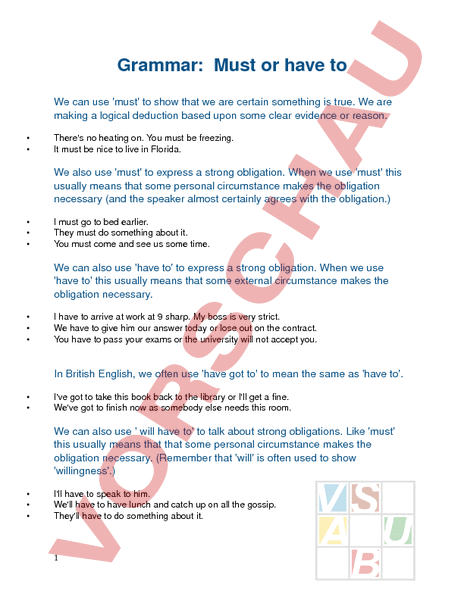Arbeitsblatt: Grammar: must and have to
Material-Details
Rules of grammar use: must and have to
Englisch
Grammatik
6. Schuljahr
2 Seiten
Statistik
126694
1066
4
17.01.2014
Autor/in
Marianne Drittenbass
Bergstrasse 66
8810 Horgen
8810 Horgen
044 770 15 40
Land: Schweiz
Registriert vor 2006
Textauszüge aus dem Inhalt:
Grammar: Must or have to We can use must to show that we are certain something is true. We are making logical deduction based upon some clear evidence or reason. • • There no heating on. You must be freezing. It must be nice to live in Florida. We also use must to express strong obligation. When we use must this usually means that some personal circumstance makes the obligation necessary (and the speaker almost certainly agrees with the obligation.) • • • must go to bed earlier. They must do something about it. You must come and see us some time. We can also use have to to express strong obligation. When we use have to this usually means that some external circumstance makes the obligation necessary. • • • have to arrive at work at 9 sharp. My boss is very strict. We have to give him our answer today or lose out on the contract. You have to pass your exams or the university will not accept you. In British English, we often use have got to to mean the same as have to. • • Ive got to take this book back to the library or Ill get fine. Weve got to finish now as somebody else needs this room. We can also use will have to to talk about strong obligations. Like must this usually means that that some personal circumstance makes the obligation necessary. (Remember that will is often used to show willingness.) • • • Ill have to speak to him. Well have to have lunch and catch up on all the gossip. Theyll have to do something about it. 1 As you can see, the differences between the present forms are sometimes very small and very subtle. However, there is huge difference in the negative forms. • • • We use mustnt to express strong obligations NOT to do something. mustnt eat chocolate. It bad for me. You mustnt phone me at work. We arent allowed personal calls. We use dont have to (or havent got to in British English) to state that there is NO obligation or necessity. • • • • We dont have to get there on time. The boss is away today. dont have to listen to this. Im leaving. You dont have to come if you dont want to. He doesnt have to sign anything if he doesnt want to at this stage. 2
